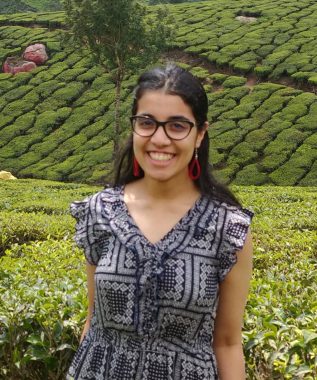Home / Anisha Nazareth
Anisha Nazareth
 |
Anisha NazarethSchool: Graduate School of Arts and Sciences Department: Urban and Environmental Policy and Planning Research Interests: Conservation and Ecology, Climate Change, Development Theory Project: “Equitable Transitions for Developing Countries” |
TIE Affiliation
Experience
Anisha is a M.S. student at the Graduate School of Arts and Sciences in the Department of Urban and Environmental Policy and Planning. She expects to complete her studies in May 2021. Prior to coming to Tufts, Anisha earned her Master of Technology in Information Technology. While working on her thesis for her previous Masters, Anisha volunteered for six months at a campaign to change consumer disposal behavior regarding e-waste. She used ethnographic methods to collect data on how this campaign evolved, and analyzed this data (using a combination of Actor-Network Theory and sociomateriality) to see how the nature of e-waste affected the success/failure of the campaign. Working on e-waste disposal also allowed her to see the unique constraints that developing countries like India faced when compared to more developed counterparts and why the same solutions would not work in both places. In the case of e-waste disposal, for instance, the landscape in which consumers made decisions about e-waste disposal in India was complicated by the presence of a large, entrepreneurial informal sector. After graduating, Anisha worked for two years as a Business Intelligence and Analytical Consultant at Thorogood Associates, Bangalore. She gained considerable experience in quantitative analysis and working with large datasets.
Current Studies and Future Goals
When asked what she found most meaningful about her field of study, Anisha responded with the following: “Climate change as an issue is interesting to me because of how it is simultaneously a science problem and a political problem as well as a social problem. Unlike other large scale disasters (Chernobyl, hurricanes, etc.), climate change is a disaster that we have known for a while is going to happen. We also know, to a certain extent, what kind of transitions will be required to ensure that we can avoid the worst impacts of climate change. Therefore, we are in a unique position where we have the time to think and plan to avoid a disaster or at least soften the blow. I think how we go about approaching this issue will be what defines what kind of future we will have. In my future career, I want to be a part of developing approaches that are equitable, proactive and innovative. I am also interested in issues of equity and just sustainable development. More specifically, I want to understand the cost and benefit of sustainability solutions and also how these costs and benefits get distributed. Environmental degradation often impacts low-income, disadvantaged members of society more than others. The benefits of advancements in technology and efficiency are slow to trickle down to these communities. I want to design and manage interventions that have a more equitable and sustainable impact on society.”
When asked why she wanted to be a TIE-SEI intern, Anisha responded with the following: “The “Equitable Transitions for Developing Countries” project interested me because it gives me the opportunity to make a contribution to a larger sustainability initiative and to work with researchers from a wide variety of disciplines. I am particularly excited by the prospect of doing an in-depth case study of how transitioning worked in a developing country and by the opportunity to go there and gather data on the ground. I believe this will allow me to gain valuable experience in fieldwork, participant observations and gathering and analyzing ‘thick’ data. I am also excited by the prospect of working on a real-world project and in having my contributions be used by people working in sustainable development.”
After graduating from Tufts, Anisha sees herself working for a think-tank, public institute or private research institute that does work at the intersection of development theory, sustainability, and information technology. She is interested in working with organizations on projects that use a combination of qualitative and quantitative data analysis techniques to model problems and explore solutions. She is fascinated by the potential that big-data analysis, machine learning, and statistical analysis techniques have for creating innovative ways to model sustainability problems and come up with viable solutions. However, Anisha is also cognizant of the politics of data collection and the dangers of blindly implementing models or drawing conclusions from data without understanding the contexts in which the model was created or the data collected. Having used ethnographic methods and done fieldwork before she wants to use fieldwork and qualitative analysis techniques to gain an understanding of context and understand the local constraints and strengths of the communities for which she is modeling problems or developing solutions.
Fun Facts!
When not doing school work, Anisha loves baking, needlework and biking around Massachusetts. She especially loves travelling to new places, buying unfamiliar ingredients and experimenting with them. Anisha is also passionately fond of reading Tolkien and is trying to learn Quenya.
Favorite food/drink: Christmas Pudding
Favorite movie/TV show: The Sound of Music
Favorite place you've visited: Vienna